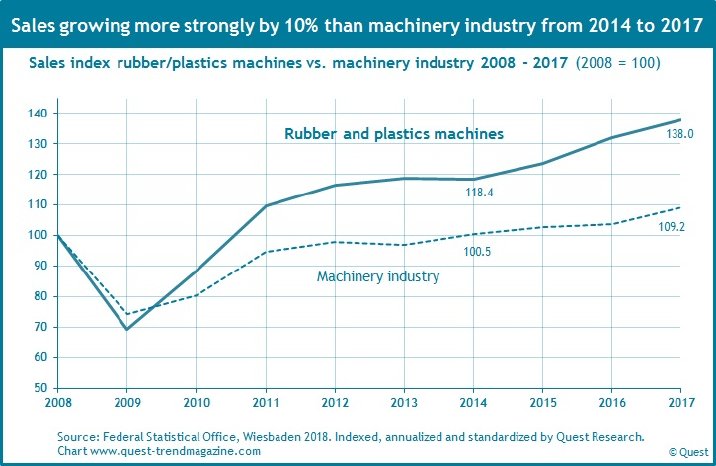The production of rubber and plastics machinery initially stagnated for several years after the crisis had bottomed out. At the beginning of 2015, however, production has been growing again with a growth rate by 9% higher than that of the German mechanical engineering industry.
While mechanical engineering production could not exceed its pre-crisis level until 2017, the rubber and plastics machinery sector was already able to do so in 2011. In 2017, production in the sector was 22% above its pre-crisis level.
Comparing sales, the rubber and plastics machinery sector is doing even better. As the Quest industry report outlines by using data from the Federal Statistical Office, sector sales grew by 10% more strongly than those of mechanical engineering sales in the period from 2014 to 2017.
In 2017, sales of rubber and plastics machinery were 38% above their pre-crisis level, while in mechanical engineering the figure stood at 9%.
Since the beginning of 2015, rubber and plastics machines have been among the dynamic growth sectors in mechanical engineering industry.
The source of this stronger sales growth lies in foreign sales. Between 2014 and 2017, foreign sales of rubber and plastics machinery grew by 10% more strongly than those of mechanical engineering and were 77% above their pre-crisis level in 2017.
In terms of domestic sales, both rubber and plastics machinery and mechanical engineering industry remained below their pre-crisis levels by 2017.
The Quest industry report is available on https://www.quest-trendmagazine.com/en/machinery-industry/rubber-and-plastics-machinery/production-and-sales-rubber-and-plastics-machinery.html
Only a long-term comparison of a mechanical engineering sector with the mechanical engineering industry reveals the special features of this sector. Further Quest reports deal in this way with the export markets, growth expectations up to 2020 and the company structure. An overview can be found on https://www.quest-trendmagazine.com/en/machinery-industry/rubber-and-plastics-machinery.html

